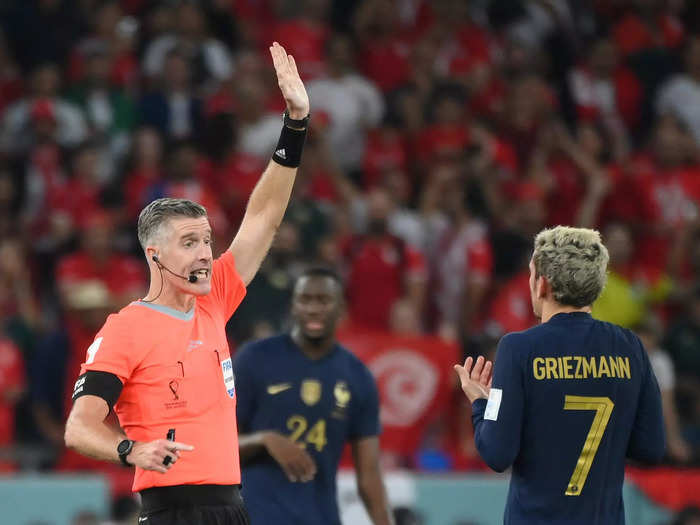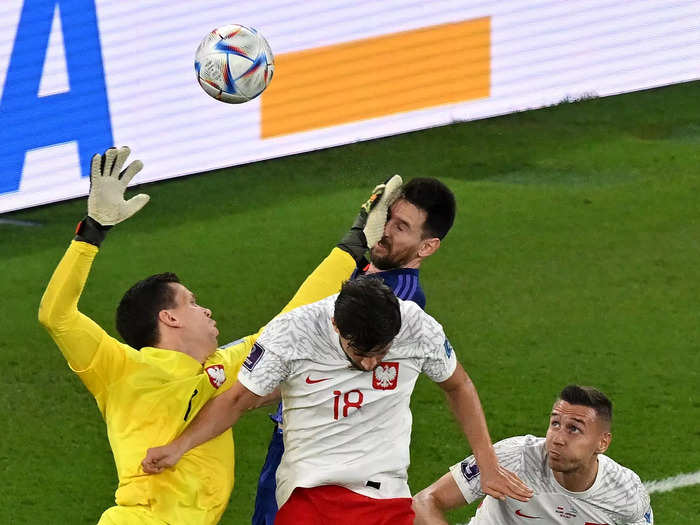VAR ruled the ball to still have been in play here for Japan's second goal against Spain.Getty/ Giuseppe Cacace
- There have a number of controversial decisions involving Video Assistant Referees at the World Cup.
- The most recent came on Thursday as Japan beat Spain 2-1.
Japan pulled off a brilliant comeback to beat Spain 2-1 and book its place in the knockout rounds of the World Cup in Qatar on Thursday, but the victory wasn't without a bit of controversy.
Spain had taken the lead early in the first half through Alvaro Morata, before being pegged back just after the break by Japan substitute Ritsu Doan.
Moments after Doan's equalizer, Ao Tanaka then bundled the ball into the net to give Japan the lead, but the referee initially ruled no goal, as the ball had appeared to go out of play before Kaoru Mitoma cut the ball back to Tanaka.
After a short consultation with the Video Assistant Referee (VAR), however, the goal was deemed good.
Though from the angles provided by television cameras, the ball looked completely out, the VAR, Fernando Guerrero of Mexico, concluded that the curvature of the ball was still overhanging the line, meaning, by the letter of the law, the ball was still in play when Mitoma touched it.
After the match, Spain head coach Luis Enrique made the astonishing claim that the photo picturing the ball in play "must have been tampered."
"It cannot be that this photo is real," he said. "It has to be manipulated."
Japan head coach Hajime Moriyasu disagreed. "There is great technology nowadays," he said. "If it were really out it would have been a goal-kick."
This isn't the only VAR decision to have caused controversy at this year's World Cup.
Below, we take a look at biggest incidents involving the technology at the tournament and explain the resulting decisions.
Croatia 0-0 Belgium – Penalty canceled for offside.
Early in Thursday's clash against Belgium, Croatia was awarded a penalty after Yannick Carrasco fouled Andrej Kramaric inside the penalty area.
But the VAR, Marco Fritz of Germany, spotted an offside in the build up and the penalty was canceled by referee Anthony Taylor.
FIFA's technology showed that Croatia's Dejan Lovren was very marginally ahead of Jan Vertonghen as he made a run into the box ahead of the penalty being awarded. Though Lovren never touched the ball, he challenged Vertonghen in the air before the ball dropped to Carrasco and hence was adjudged by Taylor to have interfered with play.
The offside call was as tight as they come and in domestic leagues like the English Premier League, where an advantage is given to the attacker in extremely close calls, the decision would likely have been different.
Tunisia 1-0 France – Equalizer disallowed for offside.
Referee Matthew Conger and Antoine Griezmann. Getty/Franck Fife
This one is controversial for two reasons.
Firstly, the decision itself.
France's Antoine Griezmann thought he had scored a late, late equalizer for France against Tunisia on Wednesday when he prodded home in the 98th minute, but after a check from the VAR, it was disallowed as the Atletico Madrid striker was adjudged to be offside.
When Aurelien Tchouameni first played the ball into the area, teammate Griezmann stood yards offside, but he made no attempt to play the ball.
Tunisia defender Montassar Talbi, however, tried to head the ball, but his clearance dropped right in front of Griezmann, who scored.
If the officials believed Talbi had made a "deliberate play" – the phase is reset, meaning Griezmann would be considered onside and his goal stands.
If the officials believed Talbi didn't make a deliberate play, the phase isn't reset, Griezmann would remain offside and the goal disallowed.
The definition of "deliberate play," though, is subjective. Essentially, the player has to be fully in control of what they are doing. They can't be stretching or reaching, and whether they are being challenged is also taken into consideration.
Now this is where it gets really complicated.
Whether or not the decision to disallow Griezmann's goal was right or wrong, France has complained to FIFA that the decision to even review the goal went against VAR protocol.
Before referee Matthew Conger went to the VAR, video evidence appears to show that he allowed Tunisia to restart with a free-kick before then blowing the final whistle.
Blowing the final whistle isn't an issue – a VAR check can still take place after full time. Allowing play to restart, however, is. By VAR protocol, it isn't possible to review the offside offense after play has resumed.
Sadly for France, even if Conger made a mistake here, it makes no difference now, as an incorrect review doesn't invalidate a match.
Poland 0-2 Argentina – Penalty for foul on Lionel Messi.
Argentina was awarded a penalty for this. Getty/Glyn Kirk
The game between Poland and Argentina Wednesday was goalless when Argentina was awarded a penalty for a foul on Lionel Messi by Poland goalkeeper Wojciech Szczęsny.
Szczęsny came out to claim a cross, but Messi got his head to the ball first, with Szczęsny's hand then colliding with the Argentine's face.
The VAR, Paulus Van Boekel, advised a penalty review. Referee Danny Makkelie then awarded it.
The issue here lies in that even though Szczęsny's hand did hit Messi's face, the contact was very soft and was made well after Messi had headed the ball, meaning it had no interference on him potentially scoring.
BBC Sport reporter Phil McNulty was among those to call out the decision to award Argentina a penalty.
"Argentina fully deserved to beat Poland, but the penalty award for Wojciech Szczesny's 'foul' on Lionel Messi was one of the worst VAR interventions I have ever seen," he tweeted.
"The worst since the 'handball' against Uruguay's Jose Gimenez a couple of days ago. A blight on this World Cup."
Portugal 2-0 Uruguay – Penalty given for handball.
On to the José Giménez penalty incident McNulty was referring to.
On Monday, Portugal was leading Uruguay 1-0 deep into overtime when Giménez was ruled to have handled the ball in the box, and Portugal was awarded a spot kick.
Replays showed the ball to have struck Giménez's trailing arm, which he was using to support his fall, as he went to tackle Portugal's Bruno Fernandes.
The Laws of the Game clearly state that players should not be penalized for handball, even if their arm is away from the body, when their "arm position is for support when falling or when getting up from the ground."
Nevertheless, following a VAR review, the penalty was given anyway and converted by Fernandes.


